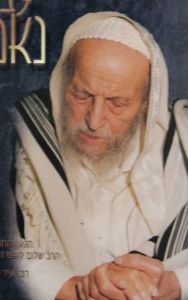A Short Tribute
Hacham Shalom Aaron Lopes was born to Hannah and Yaakov on 17 Kislev, 5665 (1904) in Aleppo, Syria.
His father, Hacham Yaakov Lopes, was a renowned kabbalist and preacher, and was President and Treasurer of the Malbish Arumim Society.
In 1913, when he was 13 years of age, Hacham Shalom Aaron Lopes immigrated with his family to the Land of Israel, where they settled in Jerusalem. Hacham Shalom Aaron Lopes studied at the Porat Yosef yeshiva with Hacham Ezra Attiah. He was certified as a teacher and appointed to the Jerusalem rabbinic court as a dayan. He became fluent in foreign languages and earned a living from teaching English and French. Hacham Shalom Aaron Lopes jointly founded the Mekabetziel charity with Hacham Yehuda Tzedaka, headed by Hacham Yaakov Meir. Its mission was to increase and transmit Torah study in all social levels of the public.
In 1950, Hacham Shalom Aaron Lopes was appointed Chief Rabbi of Acre (Akko). He held this position for close to forty-five years. During his term, he strengthened the city’s Torah institutions and established the Emet Le’Yaakov yeshiva, named after his father.
Hacham Shalom Aaron Lopes passed away on 26 Heshvan 1994, on the date marking the first year of his wife’s decease.
His printed works are Kuntras HaHashkama, Kuntrass Hit'orerut LeTefila BeShelimuta, and Shalmei Aharon.
A few quotes from the Rabbi on 'Customs of Israel' in which he warns students raised in yeshiva not to abandon their family customs
Many Jews have given themselves permission to begin the morning Shacharit prayer at Hodu. They consider everything written in the siddur prayer book from the section of the Binding [of Isaac] before Hodu to be insignificant. This situation is all the more severe among our Ashkenazi brethren, where the congregation begins praying at Hodu and Baruch She’Amar. The general public, therefore, is not stringent about first reciting the Binding and Offerings, and has all but forgotten this part of the prayer’s sequence…This sequence has been strictly maintained by the Sephardim of all origins, in all communities and synagogues, where the cantor begins by reciting the Binding out loud, not skipping or omitting anything. The Jews of Yemen have also preserved this sequence. In recent times, however, students raised in Ashkenazi yeshivot have also begun to disregard the prayer’s completeness. And out of our own failings, there are some yeshivot whose students are all Sephardi, and who also begin the prayer at Hodu. They consider the omission to be permissible, and beleive that they are allowed to abandon their ancestral customs and detach themselves from the Sephardi public.
Kuntras HaHitorerut, p. 3-4, Yeshivat Emet LeYaakov, Jerusalem, 1985/6 (5746)
